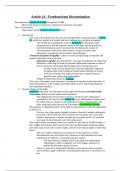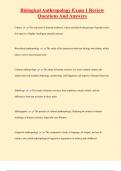-
1. Resume - Administrative law - bias, predetermination and article 6 summary
-
2. Resume - Administrative law - deference summary
-
3. Resume - Administrative law - judicial review and courts act 2022
-
4. Resume - Administrative law - legitimate expectations summary
-
5. Resume - Administrative law - oversight of policy summary
-
6. Resume - Administrative law - review of discretion summary
-
7. Resume - Administrative law - s.84 criminal justice and courts act 2015 summary
-
8. Resume - Administrative law - standing summary
-
9. Resume - Administrative law - statutory construction and fact-finding summary
-
10. Resume - Administrative law - tribunals summary
-
11. Resume - Contract law - agreement (foundations of contract) summary
-
12. Resume - Contract law - breaching terms of a contract summary
-
13. Resume - Contract law - consideration and estoppel summary
-
14. Resume - Contract law - frustration summary
-
15. Resume - Contract law - implied and express terms summary
-
16. Resume - Contract law - misrepresentation summary
-
17. Resume - Contract law - mistake summary
-
18. Resume - Contract law - third parties summary
-
19. Resume - Contract law - unequal bargaining power summary
-
20. Resume - Contract law - unfair contract terms summary
-
21. Resume - Contract law - unilateral contracts summary
-
22. Resume - European union law - conferral and subsidiarity
-
23. Resume - European union law - constitutional pluralism
-
24. Resume - European union law - democratic deficit
-
25. Resume - European union law - direct effect summary
-
26. Resume - European union law - free movement of goods summary/problem question structure
-
27. Resume - European law - horizontal direct effect of directives
-
28. Resume - European union law - liability of the union summary
-
29. Resume - European union law - national procedural autonomy and state liability summary
-
30. Resume - European union law - the principle underpinning free movement of goods
-
31. Resume - European union law - eu supremacy summary
-
32. Resume - Human rights law - article 5 (right to liberty)
-
33. Resume - Human rights law - article 6 (right to a fair trial) summary
-
34. Resume - Human rights law - margin of appreciation summary
-
35. Resume - Human rights law - extraterritoriality summary
-
36. Resume - Human rights law - common law rights vs echr rights
-
37. Resume - Human rights law - article 14 (freedom from discrimination)
-
38. Resume - Human rights law - article 10 (freedom of expression)
-
39. Resume - Human rights law - article 9 (freedom of religion) summary
-
40. Resume - Jurisprudence - unjust laws
-
41. Resume - Jurisprudence- the rule of law
-
42. Resume - Jurisprudence - the rule of recognition
-
43. Resume - Jurisprudence - role of sanctions
-
44. Resume - Jurisprudence - moral purpose/point of law
-
45. Resume - Land law - proprietary estoppel summary
-
46. Resume - Land law - leases and licenses summary/problem question structure
-
47. Resume - Land law - guest v guest
-
48. Resume - Land law - easements summary/problem question structure
-
49. Resume - Land law - covenants summary/problem question structure
-
50. Resume - Land law - co-ownership summary/problem question structure
-
51. Resume - Land law - actual occupation summary/cases
-
52. Resume - Tort law - vicarious liability and non-delegable duties summary/problem question stru...
-
53. Resume - Tort law - rylands v fletcher summary/problem question structure
-
54. Resume - Tort law - remoteness summary
-
55. Resume - Tort law - pure economic loss summary
-
56. Resume - Tort law - private nuisance summary/problem question structure
-
57. Resume - Tort law - occupier's liability summary/problem question structure
-
58. Resume - Tort law - duty of care summary (omissions and public authorities)
-
59. Resume - Tort law - defences summary
-
60. Resume - Tort law - defective products summary/problem question structure
-
61. Resume - Tort law - defective premises summary/problem question structure
-
62. Resume - Tort law - causation summary
-
63. Resume - Tort law - breach of duty summary
-
64. Resume - Trusts law - the three certainties summary/problem question structure
-
65. Resume - Trusts law - resulting trusts summary
-
66. Resume - Trusts law - quistclose trusts summary
-
67. Resume - Trusts law - the rule against private purpose trusts
-
68. Resume - Trusts law - personal liability of trustees summary
-
69. Resume - Trusts law - nature of the beneficiary's interest
-
70. Resume - Trusts law - knowing receipt
-
71. Resume - Trusts law - dispositions of equitable interests summary/problem question structure
-
72. Resume - Trusts law - constructive trusts summary
-
Montrer plus





